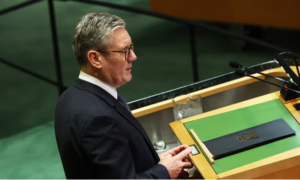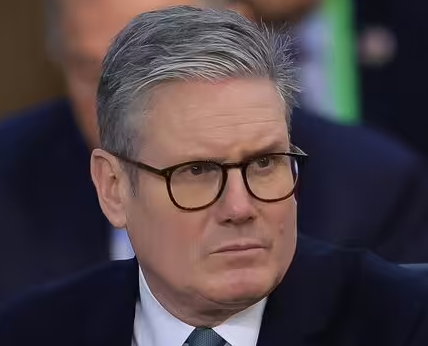Exclusive: Donations worth £10,000 in October 2023 and £6,000 in February 2024 bring gifted clothes total to £32,000

It is understood that Starmer has sought advice from the registrar of MPs’ interests and that the donations will be recategorised as donations in kind of clothing. Photograph: Michael M Santiago/Getty Images
Keir Starmer was given a further £16,000 worth of clothes by the Labour peer Waheed Alli, which was declared as money for his private office, the Guardian can reveal.
The donations, comprising £10,000 in October 2023 and £6,000 in February 2024, bring the total amount in gifted clothes to £32,000.
These latest gifts were not previously known about as they were described as being “for the private office of the leader of the opposition”.
The revelation is likely to reignite a row over the extent of donations that Starmer and some of his frontbench team acccepted while in opposition, much of it from Alli.
It is understood that Starmer has since sought advice from the registrar of MPs’ interests over the two donations, and they will be recategorised as donations in kind of clothing. The original donations were declared on time.
The prime minister has been under pressure for weeks over the support given by Alli, a media businessman, which also included more than £2,400 for glasses and the temporary use of a £18m penthouse during the election campaign.
He has also been criticised for accepting tens of thousands of pounds’ worth of football and concert ticket freebies while leader of the opposition. His wife, Victoria, also received clothes as donations, as did Rachel Reeves, the chancellor, and Angela Rayner, the deputy prime minister.
Starmer, Reeves and Rayner have all since said they will no longer accept clothes while in office. Labour argues that when they are in opposition, all parties invest in the presentation of candidates, including speech and media training, as well as photography and clothing.
Such errors do not necessarily result in a formal reprimand. It emerged earlier this month that the parliamentary standards watchdog will not investigate another instance in which Starmer initially failed to declare clothes donated to his wife, Victoria, also by Alli.
Starmer defended the use of the apartment earlier this week, saying he took the offer so that his son would have a place to study for his GCSEs without having to walk past journalists and protesters outside their family home.
The prime minister brought up the “human” reason for having moved his family out of his Kentish Town home in north London, saying no cash changed hands as a result.
Starmer has accepted almost 40 sets of free tickets during his time as Labour leader, mostly to football matches, but also £4,000 for hospitality at a Taylor Swift concert and £698 for Coldplay tickets in Manchester.
In July and August alone, the four candidates to become the next Conservative leader – Kemi Badenoch, Robert Jenrick, James Cleverly and Tom Tugendhat – received between £70,000 and £160,000 in donations each, although much of that is needed for campaigning efforts such as staff and venues.
The row over Alli’s donations risks defining Labour’s first months in office, and partly overshadowed their conference in Liverpool last week. The risks are particularly high for Starmer, given his repeated election pledges to be a contrast to the sleaze and self-interest of the Conservatives.
The SNP asked for an investigation into Alli’s donations on Friday in a letter to the standards commissioners in the House of Commons and House of Lords, the independent adviser on ministers’ interests, Sir Laurie Magnus, and the cabinet secretary, Simon Case.
The SNP MP Brendan O’Hara wrote that the revelations had “become Sir Keir Starmer’s version of the expenses scandal” and that unless the matter were “comprehensively investigated”, then it was “inevitable that the damaging drip, drip of revelations will continue to erode public trust”.
He also asked for Alli’s Downing Street pass, which he held for a time after the election, to be looked into.
Alli gave Rayner a donation for work clothing in June. He declared it as a donation in kind worth £3,550 without explaining that it was for outfits. The deputy prime minister is understood to have contacted the registrar of interests to give a fuller description of the donation.
Reeves has accepted a donation of £7,500 from a donor, Juliet Rosenfeld, since the beginning of last year, which was used to pay for clothing. Reeves declared it as a cash donation rather than as a gift and has been assured that this was within the rules.


